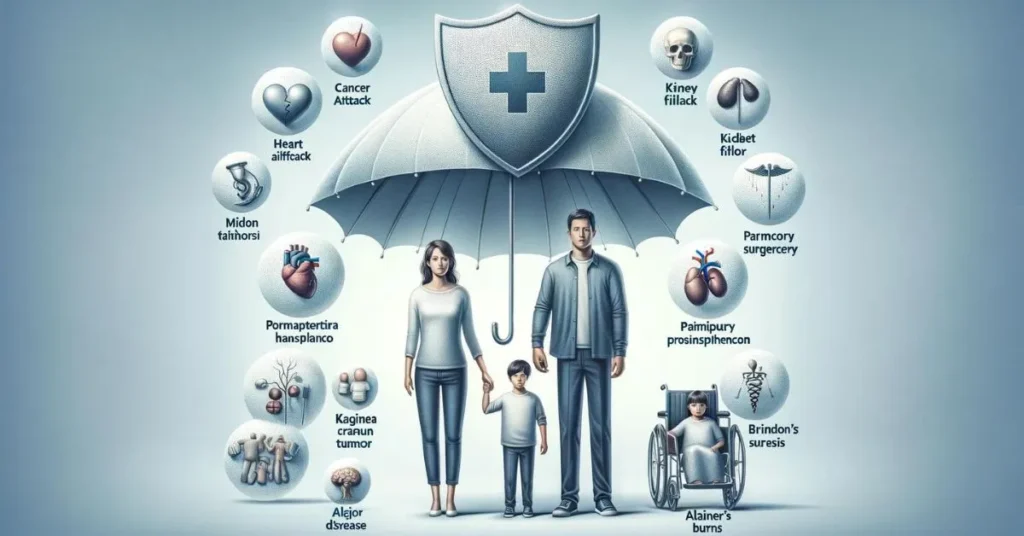Critical illness insurance is a form of health insurance policy that provides financial protection against serious health issues that significantly affect an individual’s lifestyle and income. This sort of insurance gives a lump sum payout that can be used to cover medical bills, recovery aids, and even compensation for income loss during treatment. In a nation like India, where the prevalence of noncommunicable illnesses is on the rise, critical illness insurance may provide a financial safety net for you and your family, ensuring that your savings are preserved.
Conditions covered under critical illness insurance
Here are critical conditions commonly covered under critical illness insurance policies –
- Cancer
Cancer cover is the most sensitive to critical illness insurance because it involves high-grade malignancies that are aggressive, and their treatment often involves chemotherapy, radiation, or surgery. Policies define the acceptable types and stages of cancer, which allows for the different degrees of illness and treatments. This specificity makes sure that policyholders are compensated according to the type and cost of cancer treatment that they undergo.
- Heart attack (myocardial infarction)
In critical illness health insurance policies, claims for heart attack are generally limited to the initial attack depending on the extent of the rise in cardiac enzymes and troponins. These biomarkers measure the degree of heart muscle damage and help determine the insurance payout criteria and the level of assistance needed based on the severity of the incident.
- Stroke
Stroke coverage is triggered if a stroke leads to a permanent neurological deficit confirmed with the help of CT or MRI scans. This clause in a health insurance policy is rather important as it helps the policyholder to bear potentially very costly long-term care and rehabilitation processes, as well as changes in the lifestyle that may come as a result of a stroke.
- Coronary artery bypass surgery
This surgery aims at redirecting blood flow around the blocked arteries supplying blood to the heart muscles. The coverage has to do with the cost of this major surgical procedure, which is often used to treat severe coronary artery disease. This way, the health insurance policy helps to reduce the costs that are usually incurred when undergoing this important procedure.
- Kidney failure (end-stage renal disease)
Coverage extends to cases where the kidneys are permanently damaged, and the patient must undergo treatments such as dialysis or kidney transplant. These treatments are life-sustaining and expensive, rendering it imperative for critical illness policies to factor in the high ongoing costs of renal failure.
- Organ transplants
Major organ transplants such as the heart, kidney, lung, liver, and pancreas involve extensive costs that are included in most critical illness policies. Due to the complexity and cost of these procedures, insurance assistance is crucial for receiving such potentially life-saving therapies without the risk of facing significant financial losses.
- Multiple sclerosis
Multiple sclerosis is a chronic demyelinating disease of the central nervous system that affects the nerve cells in the brain and spinal cord, which results in physical and cognitive decline over time. The critical illness policies that address this condition offer reimbursement for ongoing medical treatment and life changes caused by the advancement of the disease.
- Aorta graft surgery
This surgery involves fixing or removing part of the aorta which is the major blood vessel that transports blood out of the heart. Aortic surgery is a very complicated and relatively high-risk surgery, and health insurance aids in shifting the burden of the high costs of such specialized surgeries.
- Primary pulmonary hypertension
This severe condition which involves elevated pressures in the pulmonary artery, right ventricular hypertrophy, and heart failure is deemed a critical illness when diagnosed by tests and is covered under critical illness policies. It assists in containing the expenses of treatments that can greatly extend and enhance the quality of life.
- Parkinson’s disease
Insurance coverage for Parkinson’s Disease is necessary since the disease is characterised by irreversible and progressive degeneration of the nervous system, which results in severe motor impairment. This coverage helps deal with the large expenses that come with continuous care, specific therapies, and possible changes to the home.
- Alzheimer’s disease
Usually addressed in the later years (often diagnosed after the age of 65), Alzheimer’s disease needs policies to define the level of impaired cognition to qualify for coverage. This ensures that financial support is available as the condition requires more caregiving and may even require long-term institutional care.
- Benign brain tumour
Although benign brain tumours are not malignant, they can offer serious health hazards if located in parts of the brain that control important activities. Surgery, radiotherapy, and other therapies required to address these potentially life-threatening tumours are all covered.
- Blindness
Blindness coverage is provided when a person loses whole and irreversible sight in both eyes, which has a significant impact on their freedom and lifestyle. Financial aid assists with adjustments required for everyday functioning and maintaining quality of life.
- Paralysis
Critical sickness insurance covers permanent and complete paralysis, which is commonly caused by spinal cord injuries or severe neurological illnesses. This support is critical since paralysis necessitates extensive medical care, rehabilitation, and potential housing adaptations.
- Major burns
Critical sickness insurance covers some of the most devastating injuries, including third-degree burns that cover a large area of the body. The therapy is complex and costly, frequently including extended hospital stays, several operations, and specialist rehabilitation.
Conclusion
Choosing a critical illness policy is a proactive move towards controlling health-related financial risks, especially in today’s fast-paced environment when health uncertainties are prevalent. Each insurance has its own set of conditions and exclusions, so read and understand your policy carefully. Remember that the correct critical illness insurance gives not only financial support during difficult times, but also peace of mind, allowing you to concentrate exclusively on your rehabilitation. Equip yourself with a barrier that will protect you and your family from the unexpected financial consequences of serious illness.











